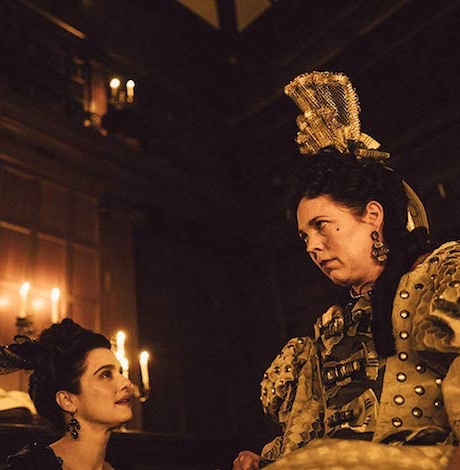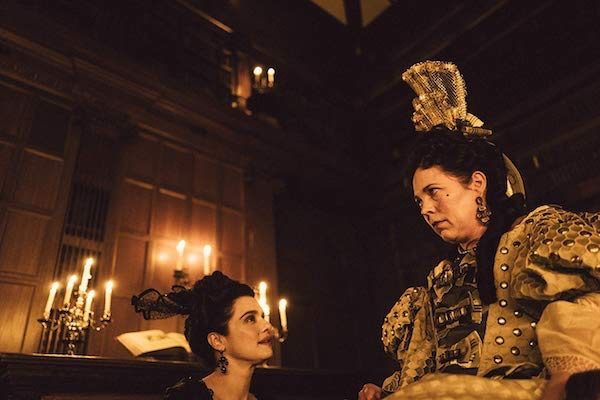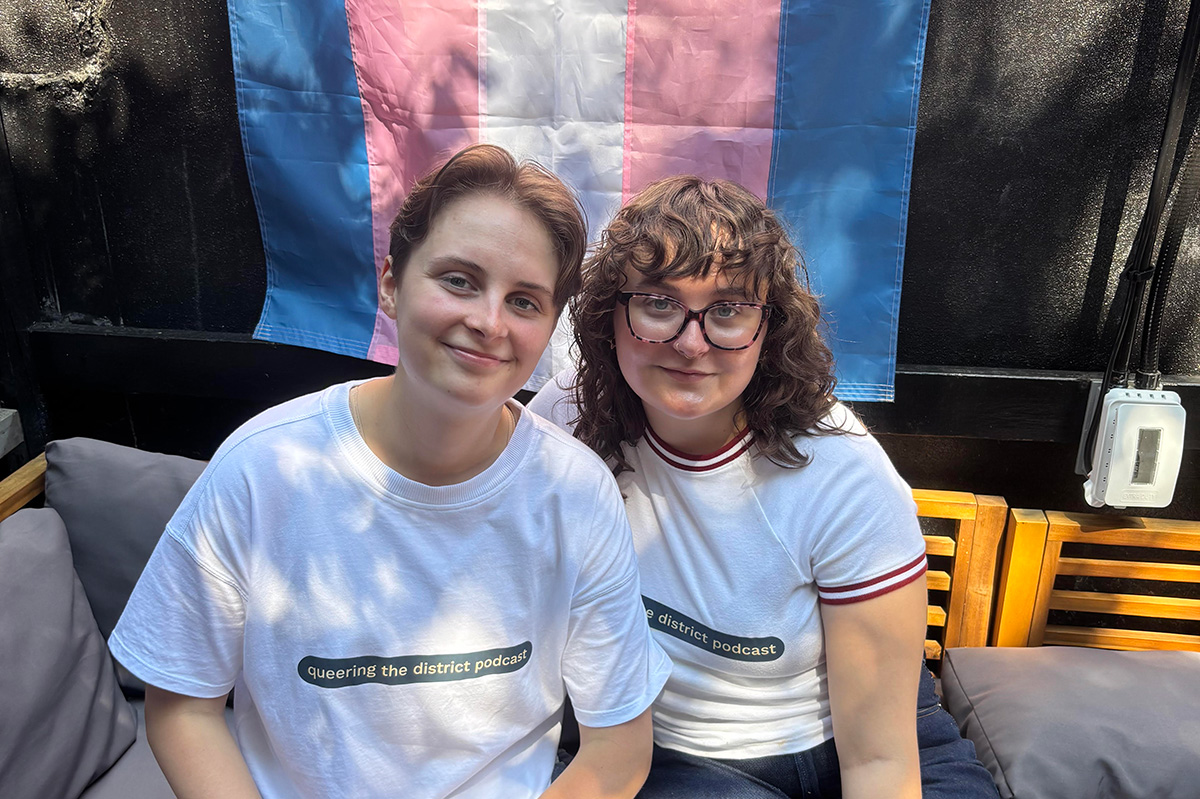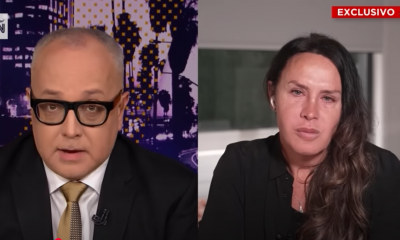Arts & Entertainment
‘The Favourite’ leads LGBT-inclusive Oscar noms
‘A Star is Born’ follows close behind


The 91st Academy Awards announced the nominees for its class of 2019 with “The Favourite” and “Roma” tying for the most recognition with 10 nominations each.
“The Favourite” earned nominations for its three lead actresses with Olivia Colman scoring a Best Actress nomination for portraying Queen Anne and Emma Stone and Rachel Weisz receiving Best Supporting Actress nominations.
“A Star is Born” came in an overall close second pulling in eight nominations including Best Picture, Best Actress and Best Original Song nominations for Lady Gaga and a Best Actor and Best Adapted Screenplay nomination for Bradley Cooper.
Other LGBT-inclusive nominations include the Queen biopic “Bohemian Rhapsody,” which became the highest grossing music biopic of all time upon its release last year.
Melissa McCarthy was nominated for her role as lesbian writer Lee Israel in “Can You Ever Forgive Me?” and Richard E. Grant received a Best Supporting Actor nomination for playing her gay friend Jack Hock.
LGBT nominees on the list were Jeff Whitty for co-writing “Can You Ever Forgive Me?,” filmmakers Rob Epstein and Jeffrey Friedman for their Netflix documentary “End Game,” Marc Shaiman and Scott Wittman for writing the original song “The Place Where Lost Things Go” from “Mary Poppins Returns” and Shaiman for Original Score for “Mary Poppins Returns.” The LGBT-inclusive film”Marguerite,” which tells the story of a nurse and an aging woman’s friendship, was also nominated for Live Action Short.
The Academy also finally gave some overdue credit to acting veterans Regina King and Sam Elliot with their first nominations. King was nominated for Best Supporting Actress for her role in the James Baldwin adaptation “If Beale Street Could Talk.” Elliot received a nom for Best Supporting Actor for “A Star is Born.”
Notable snubs in this year’s Academy Awards crop were a Best Director nomination for Cooper for his directorial debut in “A Star is Born” and Timothée Chalamet for Best Supporting Actor in the drug addiction-fueled drama “Beautiful Boy.”
Two film nominations were also historical film moments. Netflix received its first Oscar nomination for “Roma” and “Black Panther,” which earned seven nominations, became the first Marvel film to be nominated for Best Picture.
The Academy Awards air on Sunday, Feb. 24 at 8 p.m. on ABC.
Check out the complete list of nominees below.
Best Picture
“Black Panther”
“BlacKkKlansman”
“Bohemian Rhapsody”
“The Favourite”
“Green Book”
“Roma”
“A Star Is Born”
“Vice”
Best Actor
Christian Bale – “Vice”
Bradley Cooper –”A Star Is Born”
Willem Dafoe – “At Eternity’s Gate”
Rami Malek – “Bohemian Rhapsody”
Viggo Mortensen – “Green Book”
Best Actress
Yalitza Aparicio – “Roma”
Glenn Close – “The Wife”
Olivia Colman – “The Favourite”
Lady Gaga – “A Star Is Born”
Melissa McCarthy – “Can You Ever Forgive Me?”
Best Director
Spike Lee – “BlacKkKlansman”
Pawel Pawlikowski – “Cold War”
Yorgos Lanthimos – “The Favourite”
Alfonso Cuarón – “Roma”
Adam McKay – “Vice”
Best Supporting Actor
Mahershala Ali – “Green Book”
Adam Driver – “BlacKkKlansman”
Sam Elliott – “A Star Is Born”
Richard E. Grant – “Can You Ever Forgive Me?”
Sam Rockwell – “Vice”
Best Supporting Actress
Amy Adams – “Vice”
Marina de Tavira – “Roma”
Regina King – “If Beale Street Could Talk”
Emma Stone – “The Favourite”
Rachel Weisz – “The Favourite”
Best Adapted Screenplay
Joel Coen and Ethan Coen – “The Ballad of Buster Scruggs”
Charlie Wachtel, David Rabinowitz, Kevin Willmott
Nicole Holofcener and Jeff Whitty – “Can You Ever Forgive Me?”
Barry Jenkins – “If Beale Street Could Talk”
Eric Roth, Bradley Cooper
Best Original Screenplay
Deborah Davis and Tony McNamara – “The Favourite”
Paul Schrader – “First Reformed”
Nick Vallelonga, Brian Currie
Alfonso Cuarón – “Roma”
Adam McKay – “Vice”
Best Cinematography
Łukasz Żal – “Cold War”
Robbie Ryan – “The Favourite”
Caleb Deschanel – “Never Look Away”
Alfonso Cuarón – “Roma”
Matthew Libatique – “A Star Is Born”
Best Documentary Feature
“Free Solo”
“Hale County This Morning, This Evening”
“Minding the Gap”
“Of Fathers and Sons”
“RBG”
Best Animated Film
“Incredibles 2”
“Isle of Dogs”
“Mirai”
“Ralph Breaks the Internet”
“Spider-Man: Into the Spider-Verse”
Best Foreign Language Film
“Capernaum” (Lebanon)
“Cold War” (Poland)
“Never Look Away” (Germany)
“Roma” (Mexico)
“Shoplifters” (Japan)
Best Documentary Short Subject
” Black Sheep”
“End Game”
“Lifeboat”
“A Night at the Garden”
“Period. End Of Sentence”
Best Animated Short Film
“Animal Behaviour”
“Bao”
“Late Afternoon”
“One Small Step”
“Weekends”
Best Live Action Short Film
“Detainment”
“Fauve”
“Marguerite”
“Mother”
“Skin”
Best Original Song
“All the Stars” from “Black Panther,” Kendrick Lamar, SZA
“I’ll Fight” from “RBG,” Diane Warren
“The Place Where Lost Things Go” from “Mary Poppins Returns,” Marc Shaiman, Scott Wittman
“Shallow” from “A Star Is Born,” Lady Gaga, Mark Ronson, Anthony Rossomando, Andrew Wyatt and Benjamin Rice
“When A Cowboy Trades His Spurs For Wings” from “The Ballad of Buster Scruggs,” David Rawlings
Best Original Score
Ludwig Goransson – “Black Panther”
Terence Blanchard – “BlacKkKlansman”
Nicholas Britell – “If Beale Street Could Talk”
Alexandre Desplat – “Isle of Dogs”
Marc Shaiman – “Mary Poppins Returns”
Best Production Design
“Black Panther”
“The Favourite”
“First Man”
“Mary Poppins Returns”
“Roma”
Best Costume Design
“The Ballad of Buster Scruggs”
“Black Panther”
“The Favourite”
“Mary Poppins Returns”
“Mary Queen of Scots”
Best Film Editing
“BlacKkKlansman”
“Bohemian Rhapsody”
“The Favourite”
“Green Book”
“Vice”
Best Visual Effects
“Avengers: Infinity War”
“Christopher Robin”
“First Man”
“Ready Player One”
“Solo: A Star Wars Story”
Best Makeup and Hairstyling
“Border”
“Mary Queen of Scots”
“Vice”
Best Sound Editing
“Black Panther”
“Bohemian Rhapsody”
“First Man”
“A Quiet Place”
“Roma”
Best Sound Mixing
“Black Panther”
“Bohemian Rhapsody”
“First Man”
“Roma”
“A Star Is Born”
Photos
PHOTOS: Independence Day Weekend in Rehoboth
Wicked Green Pool Party, fireworks among festivities

Vacationers and residents alike enjoyed Independence Day Weekend activities in Rehoboth Beach, Del. The Wicked Green Pool Party drew hundreds to the CAMP Rehoboth fundraiser on Saturday. That evening, revelers went to the rooftops to watch the fireworks display.
(Washington Blade photos by Daniel Truitt)













Music & Concerts
Red, White, and Beyoncé: Queen Bey takes Cowboy Carter to D.C. for the Fourth of July
The legendary music icon performed on July 4 and 7 to a nearly sold-out Northwest Stadium.

Just in time for Independence Day, Beyoncé lit up Landover’s Commanders Field (formerly FedEx Field) with fireworks and fiery patriotism, bringing her deeply moving and genre-defying “Cowboy Carter” tour to the Washington, D.C. area.
The tour, which takes the global icon across nine cities in support of her chart-topping and Grammy-winning country album “Cowboy Carter,” landed in Prince George’s County, Maryland, over the Fourth of July weekend. From the moment Beyoncé stepped on stage, it was clear this was more than just a concert — it was a reclamation.
Drawing from classic Americana, sharp political commentary, and a reimagined vision of country music, the show served as a powerful reminder of how Black Americans — especially Black women — have long been overlooked in spaces they helped create. “Cowboy Carter” released in March 2024, is the second act in Beyoncé’s genre-traversing trilogy. With it, she became the first Black woman to win a Grammy for Best Country Album and also took home the coveted Album of the Year.
The record examines the Black American experience through the lens of country music, grappling with the tension between the mythology of the American Dream and the lived realities of those historically excluded from it. That theme comes alive in the show’s opening number, “American Requiem,” where Beyoncé sings:
“Said I wouldn’t saddle up, but
If that ain’t country, tell me, what is?
Plant my bare feet on solid ground for years
They don’t, don’t know how hard I had to fight for this
When I sing my song…”
Throughout the performance, Beyoncé incorporated arresting visuals: Black cowboys on horseback, vintage American iconography, and Fox News clips criticizing her genre shift — all woven together with voiceovers from country legends like Dolly Parton and Willie Nelson. The result was a multimedia masterclass in storytelling and subversion.
The “Cowboy Carter” tour has been a social media sensation for weeks, with fans scrambling for tickets, curating elaborate “cowboy couture” outfits, and tailgating under the summer sun. At Commanders Field, thousands waited in long lines for exclusive merch and even longer ones to enter the stadium — a pilgrimage that, for many, felt more like attending church than a concert.
One group out in full force for the concert was Black queer men — some rocking “denim on denim on denim on denim,” while others opted for more polished Cowboy Couture looks. The celebration of Black identity within Americana was ever-present, making the concert feel like the world’s biggest gay country-western club.
A standout moment of the night was the appearance of Beyoncé’s 13-year-old daughter, Blue Ivy Carter. Commanding the stage with poise and power, she matched the intensity and choreography of her mother and the professional dancers — a remarkable feat for someone her age and a clear sign that the Carter legacy continues to shine.
It’s been nearly two decades since Beyoncé and Destiny’s Child parted ways, and since then, she’s more than lived up to her title as the voice of a generation. With “Cowboy Carter,” she’s not just making music — she’s rewriting history and reclaiming the space Black artists have always deserved in the country canon.
a&e features
From Prohibition to Pride: Queering the District podcast reveals local LGBTQ history
The new podcast explores the hidden history and enduring impact of queer spaces in Washington, D.C.

On June 25, as Pride month inched toward its end, three queer creators launched an ambitious project to honor the spaces that built D.C.’s LGBTQ community—and connect them to today’s queer life. The first episode of their podcast, Queering the District, hit streaming platforms that day, aiming to spotlight what host and co-creator Abby Stuckrath calls “third places”: bars, clubs, and gathering spots that have served as hubs for queer life across the city.
Each episode of the 10-part series delves into a different piece of D.C.’s queer past—from landmark clubs to untold personal stories—told through the voices of drag legends, activists, DJs, historians, and patrons who lived it. The show also threads together personal experiences from today’s community, bringing the listener on an auditory journey from Prohibition-era speakeasies to contemporary nights out at places like As You Are or Saints & Sinners.
Abby Stuckrath, alongside her sibling Ellie Stuckrath, and producer Mads Reagan, make up the podcast’s creative team. A recent journalism graduate of American University, Abby told the Blade that her passion for queer storytelling began during college—and that D.C. itself played a defining role in shaping her queer identity.
“I went to American University. I graduated last year and studied journalism. When I was in school, I always wanted to focus on queer stories – especially in D.C., because I’m from Denver, Colorado, I’ve never lived in a place like this before. D.C. has always just kind of been a place I call home when it comes to my queer identity.”
But breaking into the media to tell those stories wasn’t easy. Stuckrath quickly learned that editorial support—and funding—for queer-focused projects is limited. So she decided to do it her own way.
“I kind of found out that if you want to tell stories, you kind of have to do it on your own– especially when it comes to queer stories. There’s not a lot of people begging for us to talk about queer people and to pay you for it. So I was like, ‘Okay, let’s just do it on my own.’”
The idea for the podcast first took root in conversations with Ellie, Abby’s sibling and biggest supporter. Ellie had also moved to D.C. to find more space to explore and express their queer and gender identities. Together, the two began shaping a vision that would combine storytelling, sound design, and grassroots community input.
“I was like, ‘I don’t know what exactly I want to do yet, but I want it to be queer, and I want it to be about D.C., and it’s going to be called Queering the District, and we’re going to find out what that means.’ And Ellie is my biggest supporter, and my best friend. And they were like, ‘Hell yeah. Like, let’s do this.’ And so we decided to just do it together.”
The name stuck—and so did the mission. The team began researching queer D.C. history and found a city overflowing with stories that had rarely been documented, especially in mainstream archives.
“We started looking up the history of queer culture in D.C., and it kind of just clicked from there,” Stuckrath said. “I did not know anything about how rich our history is in the city until one Google search, and then I just kept learning more and more. I was kind of pissed because I studied gender studies in school in D.C. and didn’t learn shit about this.”
Season one focuses on the role of third places—non-work, non-home spaces where queer people could gather, exist fully, and build community.
“Third places have always been the epicenter of queer life… places outside of just your own personal home, because sometimes that isn’t a safe place. And of course, the work most commonly in the past and still today, isn’t a safe place for queer people to be full of themselves. So like, bars were the first place for queer people to really thrive and meet each other.”
To make the show participatory, Queering the District includes a twist: a voicemail line where anyone can call in and share a memory or question. The team calls the phone “Fifi”—a nod to the kind of retro guestbooks often used at weddings, but reimagined for queer nightlife and history.
“We wanted to find a way for people to share their stories with us anonymously… so even though we start in Prohibition, we wanted to connect it to now—like, those people who were singing jazz to each other in a white queer bar are connected to you singing karaoke on a Sunday night at your favorite gay bar. We’re all interconnected by this third place of queer bars in D.C.”
Those connections are emotional as well as historical. While building the series, one realization hit Stuckrath particularly hard: the immense loss of queer spaces in D.C., especially in neighborhoods that have since been heavily redeveloped.
“Every time I go to a Nats game, I think about, well, this just replaced five gay bars that used to be here. It used to be the home of Ziegfeld’s… Tracks, which was almost 2,000 square feet, with a volleyball court in the back, a fire pit, and iconic light show. I just didn’t know that we had that, and it made me sad for the queer elders that are in our city now who walk the streets and don’t see all those places they used to call home.”
That sense of loss—alongside the joy and resilience of queer community—is what the show aims to capture. As the podcast continues, Abby hopes it serves as both a celebration and an educational tool, especially for young LGBTQ people arriving in D.C. without realizing the queer foundations they’re walking on.
“D.C. is a unique city, and specifically young queer people who are hoping to move to the city—to know that you’ve got to know your history to be here. I hope this serves as an easier way for you to consume and learn about queer history, because queer history defines how we move in life.”
And for all the voices still left out, Abby is clear: this podcast is an open door, not a final word.
“This is a perfectly imperfect podcast. We should just be a starting point. We shouldn’t be the ending point.”
New episodes of Queering the District drop every Wednesday on all major platforms.
-

 Virginia2 days ago
Virginia2 days agoDefying trends, new LGBTQ center opens in rural Winchester, Va.
-

 South Africa5 days ago
South Africa5 days agoLesbian feminist becomes South African MP
-

 Travel4 days ago
Travel4 days agoManchester is vibrant tapestry of culture, history, and Pride
-

 Opinions3 days ago
Opinions3 days agoUSAID’s demise: America’s global betrayal of trust with LGBTQ people












